-

新人教版高中英语必修2Unit 5 Music-Discovering Useful Structures教案一
Step1:自主探究。1.(教材P52)Born(bear) in the USA on 2 January 1970, Whitacre began studying music at the University of Nevada in 1988.2.(教材P52) Moved(move) by this music, he said, “It was like seeing color for the first time.”3.(教材P56)I was very afraid and I felt so alone and discouraged(discourage).4.(教材P58)Encouraged(encourage) by this first performance and the positive reaction of the audience, I have continued to play the piano and enjoy it more every day.Step2:语法要点精析。用法1:过去分词作表语1).过去分词可放在连系动词be, get, feel, remain, seem, look, become等之后作表语,表示主语所处的状态Tom was astonished to see a snake moving across the floor.汤姆很惊讶地看到一条蛇正爬过地板。Finally the baby felt tired of playing with those toys.终于婴儿厌倦了玩那些玩具。注意:1).过去分词作表语时与被动语态的区别过去分词作表语时,强调主语所处的状态;而动词的被动语态表示主语是动作的承受者,强调动作。The library is now closed.(状态)图书馆现在关闭了。The cup was broken by my little sister yesterday.(动作)昨天我妹妹把杯子打碎了。2)感觉类及物动词的现在分词与过去分词作表语的区别过去分词作表语多表示人自身的感受或事物自身的状态,常译作“感到……的”;现在分词多表示事物具有的特性,常译作“令人……的”。

新人教版高中英语必修2Unit 5 Music-Listening and Speaking教案
This lesson is about music. Students can classify the types of music through the instruments and its sound and can talk about their preferences about music, even join some activities and play a role in them according to their musical talents. On the basis, they are guided to use the languages to express their preferences and some plosive sounds and their rules.1. Classify the music types through the instruments and its sound.2. Listen and understand what the speakers’ preferences are and the reasons; talk about their own preferences and give their own reasons, using these sentences: “What kind of music do you like? And why? “ “Because it makes/gives me energy/peaceful.../touches my heart...”.3. Learn some plosives and the rules.4. Join some activities and play a role in them according to the talents. 1. Listen and understand what the speakers’ preferences are and the reasons;2. talk about their own preferences and give their own reasons, using these sentences: “What kind of music do you like? And why? “ “Because it makes/gives me energy/peaceful.../touches my heart...”.3. Learn some plosives and incomplete plosives and its rules.Step 1 Lead inPoint at the pictures on P50 and ask Q1: What are the people doing in the pictures below?Q2: What kind of music they are?Then play the MP3s one by oneStep 2 ListeningTask 1: A reporter from the school newspaper is interviewing students about music. Listen to the interviews. Draw lines between the words to make complete sentences. Some words will not be used.

新人教版高中英语必修2Unit 5 Music-Reading and Thinking教案二
1. Get basic information about Eric; read deeply to understand the history and development of the virtual choir.2. Understand what the function of the virtual choir is and how to make a virtual choir.3. Understand the meaning of some languages in the context of the text through question guidance, such as “Many people do not have close friends or contacts who have the same interest in music.” and so on.Step 1 Leading-in1. Answer the following questions.Q1:Do you know the Apps like Tik Tok and Quick Hand?Q2: Do you want to make a Tik Tok video or a Quick Hand video?2. Play a Tik Tok video Step 2: Understanding the title Q1:What does the title mean ?Q2: Is the article a narration or exposition? Why? Q3: Can you change the title ? If you can, what is the title?Step 3: Scanning the whole text and getting the basic information1. Answer the following questions.Q1:Who came up with the idea for a virtual choir?Q2: Where did Eric studied the musical composition?Q3: What is his song?2. Find the main idea of each paragraph3. Deal with some new words.Step 4: Reading carefully to get detailed informationPara 1 How to make a virtual choir1. PreparationA. tools: a virtual camera; an Internet connectionB. hero/heroin: friends or some individuals who have the same interests2. Process
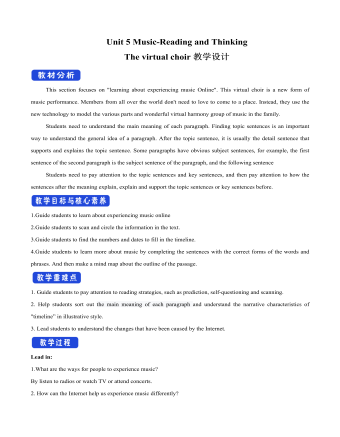
新人教版高中英语必修2Unit 5 Music-Reading and Thinking教案一
This section focuses on "learning about experiencing music Online". This virtual choir is a new form of music performance. Members from all over the world don't need to love to come to a place. Instead, they use the new technology to model the various parts and wonderful virtual harmony group of music in the family. Students need to understand the main meaning of each paragraph. Finding topic sentences is an important way to understand the general idea of a paragraph. After the topic sentence, it is usually the detail sentence that supports and explains the topic sentence. Some paragraphs have obvious subject sentences, for example, the first sentence of the second paragraph is the subject sentence of the paragraph, and the following sentenceStudents need to pay attention to the topic sentences and key sentences, and then pay attention to how the sentences after the meaning explain, explain and support the topic sentences or key sentences before.1.Guide students to learn about experiencing music online2.Guide students to scan and circle the information in the text.3.Guide students to find the numbers and dates to fill in the timeline.4.Guide students to learn more about music by completing the sentences with the correct forms of the words and phrases. And then make a mind map about the outline of the passage.1. Guide students to pay attention to reading strategies, such as prediction, self-questioning and scanning.2. Help students sort out the main meaning of each paragraph and understand the narrative characteristics of "timeline” in illustrative style.3. Lead students to understand the changes that have been caused by the Internet.

新人教版高中英语必修2Unit 5 Music-Reading for Writing教案二
The Internet celebrity Gao Yifeng. Years ago, he owned 5 companies and the staffs over 1,000, but during the economy crisis, he became nothing but debt. He was so worried that his hair became white overnight. There was a time when he wanted to killed himself. But after listening to the song Start Over by Liu Huan, he decided to cheer himself up. He started a steamed bun shop and gradually became a national chain shops. Now he became successful again.Walter Haddon said, “Music is the medicine of a troubled mind.” Music contains such a pleasant and inspiring force. Music gave him courage and bravery. When he listened to the song, it made his spirit fly like a kite in the wind. Music gave him strength and brought him relief. It was the rock I leant on to become strong and to get through those hard times. I hope none of us have to go through the same kind of suffering that he did. At the same time, we all go through various periods when we feel sad or alone. During those times, music can help us in the same way that it helped him. I hope we all will somehow begin to treasure music and make it a part of our life. Thank you for your listening !5.Revise your writing each other.Does he/she explain how music has changed his/her/someone else’s life?Are some of the rhetorical devices included and used properly ?Does he/she talk about how music makes him/her/someone feel?Is the first word in each sentences capitalised?Does he/she use correct punctuation ?
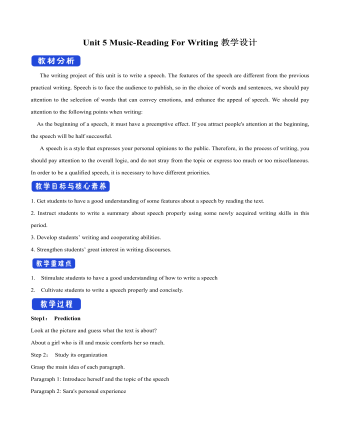
新人教版高中英语必修2Unit 5 Music-Reading For Writing教案一
(4)Now we have heard a number of outstanding speeches ... 我们已经聆听了许多精彩的发言……(5)Because we wanted the nations of the world, working together, to deal with ... 因为我们希望全世界各国团结起来去应对……(6)And if we do not act ... 如果我们不采取行动……(7)Now, I share the concerns that have been expressed ... 我也同意对于……表达的担心(8)Let us show the world that by working together we can ... 让我们告诉全世界,通过一起努力我们可以……(9)It is now time for us to ... 是时候我们……(10)And I have always wished that ... 我一直希望……(11)Thank you for letting me share this day with me.感谢你们和我共度这一天。实践演练:假如你是高中生李华,你校将举办一次以“音乐”为主题的演讲比赛,请你按照主题,写下你的演讲稿。注意:词数100左右。First of all, thank you for listening to my speech. My topic is: love music like love yourself.Music is like the air we need to maintain our normal lives around us. You can't imagine how terrible a world without music would be. Movies and TV shows have no music, only dry conversations and scenes; mobile phones only vibrations; streets only noisy crowds; cafes, western restaurants only depressed meals. What a terrible world it is!As a student, I hope we all can enjoy the fun brought by music in our spare time. Instead of just listening to music, we can even make our own music. Let's enjoy the fun of music!Thanks again for your attention!

新人教版高中英语必修2Unit 1 Cultural Heritage-Discovering Useful Structure教案二
This theme of the part is “ Describe people or things in greater detail”. Students have learned the grammar(restrictive relative clauses) in Book 1, and further review and consolidate its structure “prep+relative pronouns(which/whom)” and the relative adverbs(when, where and why), besides students should understand its form, meaning and functions. In this section, students should be able to express the grammar correctly in daily communication and in the writing. 1. Review the basic usages of relative pronouns and adverbs of attributive clauses . 2. Learn to use some special cases about restrictive relative clauses.3. Learn to write sentences with restrictive relative clauses flexibly according to the context.1. Review the basic usages of relative pronouns and adverbs of attributive clauses .2. Learn to use some special cases about restrictive relative clauses.3. Learn tow rite sentences with restrictive relative clauses flexibly according to the context.Step 1. Observe the following sentences, and mark the relative pronouns and the adverbs. 1. After listening to the scientists who had studied the problems, and citizens who lived near the dam, the government turned to the United Nations for help.2. Temples and other cultural sites were taken down piece by piece, and then moved and put back together again in a place where they were safe from the water.Step 2 PracticePlease complete these sentences with relative pronouns and relative adverbs and answer the following questions.Questions: 1. What is the head noun ?2. What relative words should be used ?3. What elements do they act in these sentences ?

新人教版高中英语必修2Unit 1 Cultural Heritage-Reading and Thinking教案二
1. This section focuses on "Understanding how a problem was solved”, which is aimed to guide students to analyze and discuss the challenges and problems faced by cultural heritage protection during the construction of Aswan Dam, as well as the solutions. On the basis of understanding, students should pay attention to the key role of international cooperation in solving problems, and attach importance to the balance and coordination between cultural heritage protection and social and economic development. Students are encouraged to face challenges actively, be good at cooperation, and make continuous efforts to find reasonable ways and means to solve problems.2. Enable students to understand the main information and text structure of the reading text;3. Motivate students to use the reading strategy "make a timeline" according to the appropriate text genre;4. Enable students to understand how a problem was solved;5. Enable students to understand the value of protecting cultural heritage by teamwork and global community;1. Guide students to pay attention to reading strategies, such as prediction, self-questioning and scanning.2. Help students sort out the topic language about protecting cultural relics and understand the narrative characteristics of "time-event" in illustrative style3. Lead students to understand the value of protecting cultural heritage by teamwork and global community;

新人教版高中英语必修2Unit 4 History and Traditions-Discovering Useful Structure教案一
Step 5 Practice一、完成下列句子。1. Judy and I _______________(把车停下来(park))in an underground car Park near Trafalgar Square, where we could ______________________(让我们的车充电(charge)).2. When we finally reached the service desk to ask for audio guides, we heard it ___________ that there were no audio guides____________(留下,剩下).3. We__________________________(发现自己对...很惊讶)the large number of visitors and the amount of noise at the entrance of the National Gallery.4. Judy ____________________(眼神专注于) Van Gogh’s Sunflowers. It was hard to approach the painting as there were so many people around.5. She ____________________(把这幅画的复制品装箱(box)) to ensure that it was delivered safely.答案:1.had our car parked get our car battery charged 2. announced left 3. found ourselves very surprised 4. had her eyes fixed on 5. had a copy of the painting boxed二、用过去分词对下列句子进行改写。1. Loch Ness was surrounded by beautiful natural landscape, which made it look amazing.2. Carl and his friend stayed with a generous family who offered them bread with butter and honey that was homemade.3. The family’s ancestors once attended to soldiers who were wounded in the First World War.4. The young people were attracted by the legend of Loch Ness. They watched over the lake with their cameras and binoculars, which were positioned on the hill.答案:1. Loch Ness surrounded by beautiful natural landscape looks amazing.2. Carl and his friends stayed with a generous family who offered them homemade bread with butter and honey.3. The family’s ancestors once attended to wounded soldiers in the First World War.4. The young people attracted by the legend of Loch Ness watched over the lake with their cameras and binoculars positioned on the hill.

新人教版高中英语必修2Unit 5 Music-Listening&Speaking&Talking教案
choir memberspeople to run food stands people to sell festival ticketspeople to sell music CDspeople to set up equipmentmusical performersStep 2: Listen to the announcement again and answer the questions. ? 1. What kind of songs will Grace Davis sing at the festival?? 2. Who can try out as a performer?? 3. What can those who think they do not have musical talent do?? 4. How can students volunteer to take part?? Talking about preferences:? Would you prefer doing ..?? What would you prefer to do?? Would you rather do .... or ….?? What would you rather do?? I'd prefer .... to ..? I'd rather have ... than .. Step 3: Speaking ProjectWork in groups. Role-play the conversation or make a new one.? Debbie: Where have you been? You missed the announcement about the music festival.? John: I was at the doctor's office. Music festival?? Frank: Yes, it's going to be next month on the school sports field. John, you can play the piano. How about playing it at the festival?? John: Well, I'd rather play the violin. I can play Liang Zhu.? Frank: Wow! Sounds good. What about you, Debbie? ? Debbie: Actually, I don't have much musical ability. I'd prefer just to help out with the crowds.? Frank: You can sell tickets or work at a food stand.? John: So can I assume that the aim of the festival is to raise money?? Debbie: Yes. All of the money will go to charity.
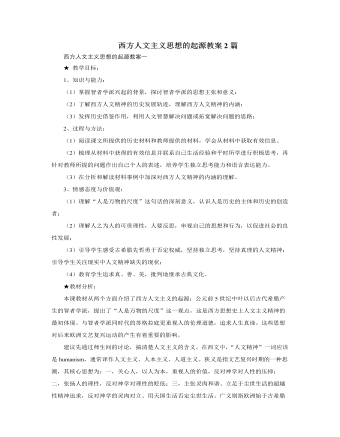
人教版高中历史必修3西方人文主义思想的起源教案2篇
在当时雅典的公民大会和陪审法庭上,人们常常要发表意见,要和自己的对手辩论,雅典法庭规定每个公民须替自己辩护,不许旁人代辩。所以出现了这样一批专门教授人辩论、演说、修辞的技巧和参政知识的职业教师。①政治因素:雅典奴隶制民主政治发展到顶峰,成为希腊政治和文化中心。参与政治生活成为每个公民生活的重要内容②古希腊工商业发展,奴隶制经济繁荣(在广大奴隶的劳动基础上,古希腊的经济迅速发展起来,为哲学的成长提供了物质条件)——根本原因③人的地位的提高(民主政治制度和每个公民参与政治意识的加强,使人的中心地位日益突出)最后教师强调:提示并强调学生学习时要注意理解“一定的文化是一定社会的政治和经济在观念形态上的反映”。3、代表人物:普罗泰格拉4、研究领域:人和人类社会关注人与人之间的关系、社会组织、风俗习惯和伦理规范

人教版高中政治必修3在文化生活中选择教案2篇
(二)“奥运福娃”探究1、“五福娃”体现了哪些精神?体现了“科技奥运、人文奥运和绿色奥运”的奥运精神也体现了“团结、奋进、爱好和平”的民族精神。2、“龙”是中华民族的图腾,我们自称是龙的传人,但北京奥运吉祥物里为什么没有“龙”?“龙”(dragon)在我国是美好的意思,例如龙凤呈祥,但在西方是魔鬼,很恐怖。北京奥运不仅是中国的奥运,更是世界的奥运,因此,福娃的原形中没有龙,这就是文化选择的结果。(三)感受先进文化1、交流自己最喜爱的文化。2、观看《千手观音》,谈观后感。(四)阳光下有阴影1、小品《电脑算命》2、课堂辩论正方:“烧香敬神”是封建迷信活动,不可取反方:“烧香敬神”是精神信仰活动,可取3、提高眼力,拒绝污染了解现实生活中的落后文化、腐朽文化,自觉抵制社会中落后文化、腐朽文化的毒害。
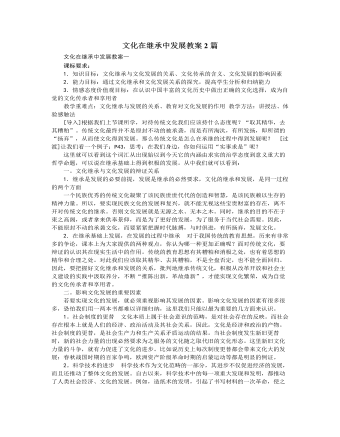
人教版高中政治必修3文化在继承中发展教案2篇
三、教育在文化传承中的作用 ★ 教师活动:引导学生阅读教材46页内容,并思考在文化传承中,教育有什么作用?★ 学生活动:积极思考并讨论问题 1、教育是人类特有的传承文化的能动性活动,具有选择、传递、创造文化的特定功能,在人的教化与培育上始终扮演着重要的角色。 ★ 2、教育通过对受教育者的“传道、授业、解惑”,把文化传递给下一代。 教育能够以浓缩的形式,重演人类在漫长的历史中走过的认识世界的过程,使人们在有限的学习生涯中获得既有的文化财富,“站在前人的肩膀上”从事文化创造。 3、随着教育方式的不断变革,教育在人类文化的传承中将产生越来越大的影响。★ 2)文化对社会发展产生深刻影响 ★ 文化作为一种精神力量,对人类社会的发展产生着深刻的影响,先进的、健康的文化对社会的发展产生巨大的促进作用,反动的、腐朽没落的文化则对社会的发展起着重大的阻碍作用。
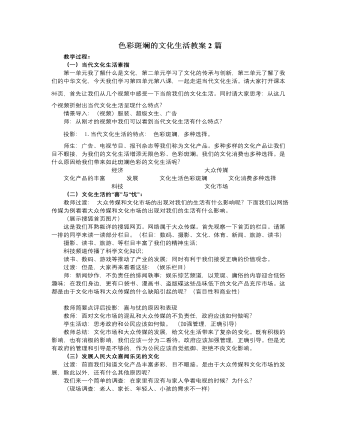
人教版高中政治必修3色彩斑斓的文化生活教案2篇
六、学习效果评价设计1、评价方式:我对学习效果的评价,来自两个方面。一是教师的教授是否认真、严肃、科学;二是学生的学习成果如何,是否达成了事先预设的教学目标,是否在学习过程中有提高的过程。评价的方式有:同伴评价;教师自我评价和反思;学生反馈。2、评价量规:我设置了几个问题用于课后的教学评价:(1)教学目标是否符合课标要求,是否符合三贴近原则,是否体现学生学习效果的生成性和过程性。(2)学习所用资源是否来自生活实际,是否真实,是否是学生感兴趣的问题。(3)教师在课堂教学过程中是否能有效的通过提问和资料的展示分析,引导学生自己生成思考过程,而不是“教师代替学生的思考”。(4)学生参与的广度和态度,学生是否提出有意义的观点和问题。学生的回答是否是实话。
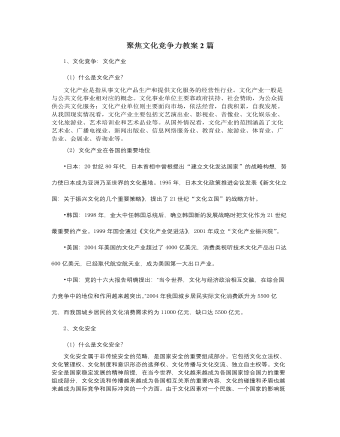
人教版高中政治必修3聚焦文化竞争力教案2篇
教学目的:通过学生课前收集资料、课堂展示、小组讨论及教师总结和讲解等形式,明确文化竞争力在国际竞争中的地位,感受各国各国日益激烈的文化竞争力,探讨如何提升中国特色社会主义文化的竞争力,培养学生的分析解决问题的能力,增强责任意识、科技意识和成才意识。教学时间:1小时课前准备:(1)学生分组收集美国、日本、英国等国家文化产业的发展状况和中国文化走向世界的资料,并要求制成简单的课件。(2)分组讨论课本P23—25的三个探究问题(①运用这些资料,从物质和精神两个方面,说明发展文化有什么意义。②你还能从社会生活的哪些现象中感受到一个国家的文化竞争力?③今天,中国文化为什么能够在世界各地赢得尊重与喝彩?),组长整理好讨论结果。
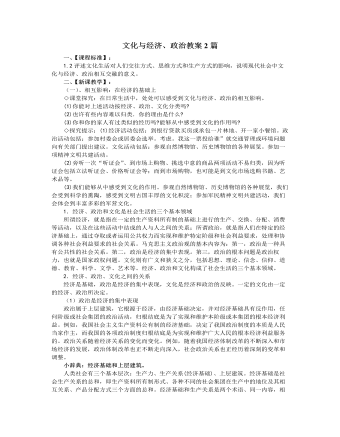
人教版高中政治必修3文化与经济、政治教案2篇
1.在激烈的国际竞争中,美国为首“巴统”在对中国出口高科技产品的问题上采取了种种限制措施,以避免西方发达国家的高科技技术和设备流人中国。面对发达国家的技术封锁,我们应该( )A.加速我国对外开放的步伐B.尽快改善与西方发达国家的关系C.努力提高自身的科技水平,增强本国的综合国力D.立足于自力更生,努力开发所有的高科技技术,以免受制于人答案:C解析:在当今和未来的世界,经济是基础,科技是龙头。因而,发展经济和科学技术是世界大多数国家最关心的问题。各国之间的竞争越来越多地转向经济和科技领域。各国都已经清楚地认识到,能否在科技发展上取得优势,增强以经;济和科技为基础的综合国力,最终将决定本国在国际上的地位。受各种主客观条件的限制,任何国家都不可能开发出自己所需要的所有技术,国家之间必须加强技术交流,互通有无,共同发展。“巴统”对我国进行技术出口方面的限制是基于其敌视中国的战略需要。为了打破西方国家的对我国的技术限制,我国必须从自身出发,提高自身的科技水平。

人教版高中地理必修3资源的跨区域调配教案
使学生了解天然其资源的特点, 我国天然气资源分布 和 利用开发现状,理解西 气东输工程的意义,学会分析跨区域资源调配与区域经济发展之间的关系。过程与方法 1、通过对我国天然气资源利用开发现状的分析,培养学生地理逻辑思维能力。2、通过学生阅读分析图表文字信息,提高学生归纳 和把握事物重点的能力。3、通过活动设计,培养学生自主学习能力和探究能力。情感、态度与价值 观1、通过我国资源开发利用与经济发展之间的矛盾分析,培养学生全面、辩证看待问题的能力。2、通过对天 然气跨区与调配工程和西电东 送工程 的了解,帮助学生树立正确的资源观和环境观。教学重点1、我国能源生产和消费地区差异、油气资源 分布和开发现状。2、提高资源利用效率,促进东、西部之间协调发展。3、理解西电动送工程的原因及意义。
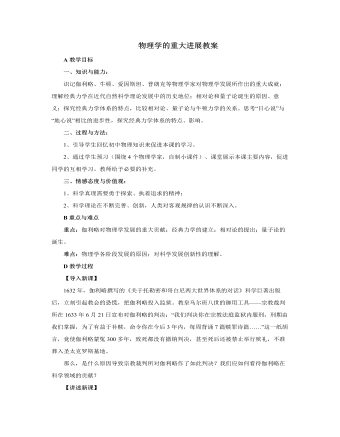
人教版高中历史必修3物理学的重大进展教案
B重点与难点重点:伽利略对物理学发展的重大贡献;经典力学的建立;相对论的提出;量子论的诞生。难点:物理学各阶段发展的原因;对科学发展创新性的理解。D教学过程【导入新课】1632年,伽利略撰写的《关于托勒密和哥白尼两大世界体系的对话》科学巨著出版后,立刻引起教会的恐慌,把伽利略投入监狱。教皇乌尔班八世的御用工具——宗教裁判所在1633年6月21日宣布对伽利略的判决:“我们判决你在宗教法庭监狱内服刑,刑期由我们掌握,为了有益于补赎,命令你在今后3年内,每周背诵7篇赎罪诗篇……”这一纸胡言,竟使伽利略蒙冤300多年,致死都没有撤销判决,甚至死后还被禁止举行殡礼,不准葬入圣太克罗斯墓地。那么,是什么原因导致宗教裁判所对伽利略作了如此判决?我们应如何看待伽利略在科学领域的贡献?
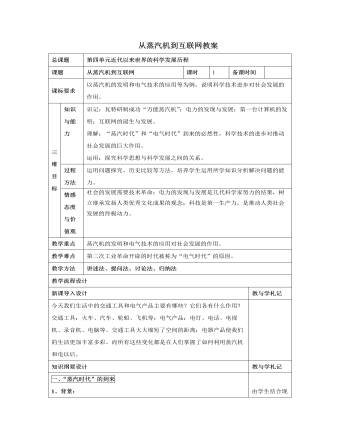
人教版高中历史必修3从蒸汽机到互联网教案
(2)根据材料二与所学知识,从经济、政治、思想文化三个方面,分析欧洲近代科技迅速发展的原因。答:资本主义工商业的成长刺激了对技术的需求,为近代科技的发展提供了工具和手段;资产阶级革命为资本主义发展、科技进步开辟了道路;人文主义和理性精神解放了思想,推动近代科技迅速发展。(如答出其它原因,言之有理,可酌情加分,但不得超过该问总分)(3)根据材料二三与所学知识,分析清代(鸦片战争前)中国科技发展停滞的原因。答:君主专制维系腐朽制度;重农抑商、闭关政策阻碍资本主义萌芽发展;自然经济不能提供近代科技发展的物质基础;文化专制政策(或崇尚理学、八股取士、文字狱等)禁锢思想,摧残人才,阻碍科技发展。(如答出其它原因,言之有理,可酌情加分,但不得超过该问总分。)(4)简述从中西方科技发展变化的历史中得到的启示。答:评分说明:围绕生产力发展,政治经济变革、思想解放与科技发展的关系等任一角度回答,言之有理,均可酌情赋分
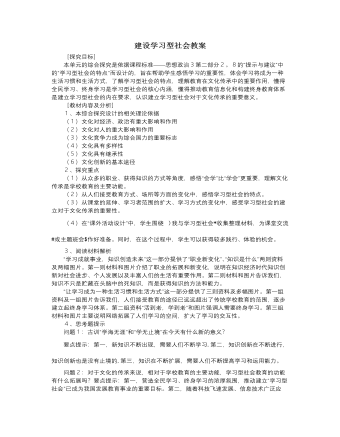
人教版高中政治必修3建设学习型社会教案
三、第三阶段。课后感悟与收获1、让学生以“走向学习型社会”为题,将在收集与整理、展示与交流两个环节中获得的体验和感悟,以心得体会的形式写一篇小论文。2、办一期专栏或黑板报,将优秀小论文作集中展示与交流。(进行理论总结,将实践与理论相结合,让科学理论更好地指导实践。充分挖掘学生潜力,增强学生的自信)[评析]新课程理念之一就是政治课不应只局限于课堂上的教与学。把综合探究课与研究性学习相结合,不失为一种有益的尝试。传统的学习方式把学习建立在客观性、受动性、依赖性的基础上,把学生看成一个没有感情的接受容器,这种学习会窒息学生的思维和智力,成为学生发展的障碍。单元探究活动的开展就是要转变学生的学习方式,关注学生的学习过程,使得探究过程成为学生发现问题、提出问题、分析问题、解决问题的过程,培养学生的创新精神和实践能力。本教案的第一阶段充分发挥了学生的主动性。